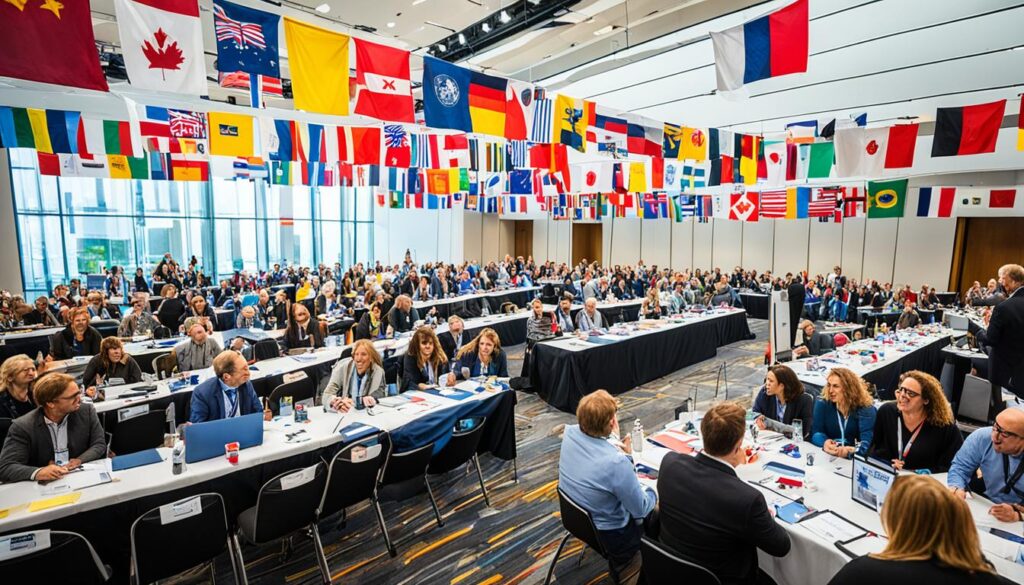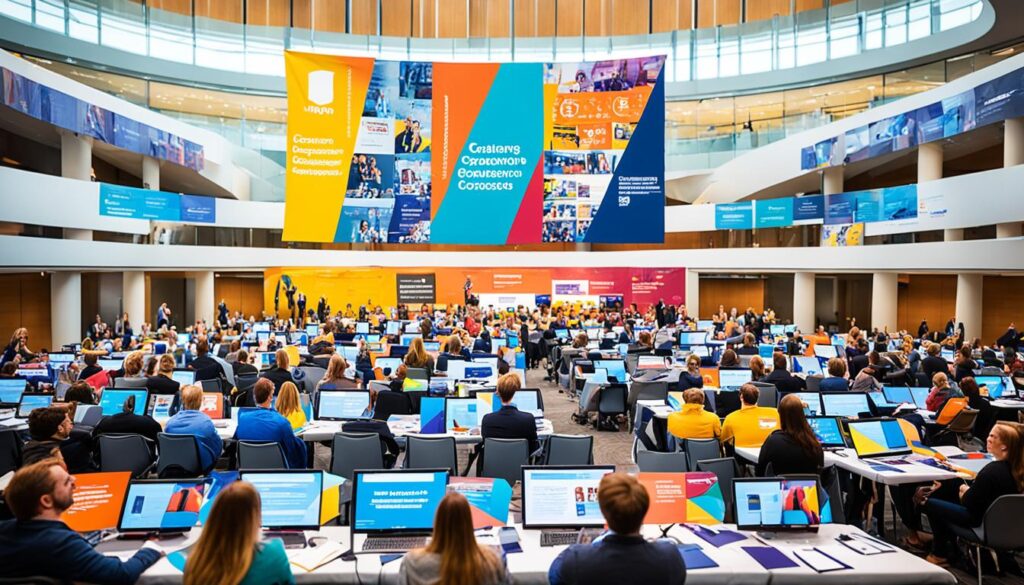The world of higher education is always changing. This means there are more chances for professionals to meet, learn, and help shape the future of schools. In 2024, many conferences will take place, focusing on important issues and new trends in colleges and universities.
As Maya Angelou, a famous author and teacher, once said, “When you learn, teach. When you get, give.” This quote shows what higher education conferences are all about. They’re places where sharing knowledge and making strong connections can really change the academic world.
Key Takeaways
- Explore a diverse array of higher education conferences happening in 2024 across the United States and globally.
- Discover the value of attending these events, from networking opportunities to industry insights.
- Learn about the latest trends shaping the future of academic events and professional development.
- Understand the different types of conferences, including regional, national, and international gatherings.
- Gain tips for making the most of your higher education conference experience, from preparation to networking.
Exploring the Landscape of Higher Education Conferences
Higher education conferences are key spots for experts to network, learn, and keep up with new trends. They let educators, admins, and researchers talk, share findings, and find new ways to tackle challenges.
What Makes Higher Education Conferences Valuable
These conferences bring many benefits to those who attend, such as:
- Chances to meet peers and leaders in the field
- Access to new research, best practices, and tech
- Insights into the changing world of higher education
- Inspiration and ideas to use at their own schools
Trends Shaping the Future of Academic Events
The world of higher education is always changing, and so are the trends in academic conferences. Some new trends include:
- More focus on working together across different fields
- Using new tech, like online and mixed events
- Putting a spotlight on diversity, equity, and inclusion
- More focus on being green and eco-friendly
By keeping up with these trends, higher education pros can make sure their conference experiences stay useful and timely.
“Higher education conferences are not just about sharing information – they’re about cultivating connections, sparking innovation, and shaping the future of our field.”
Regional Higher Education Conferences
There are many regional higher education conferences beyond the big national and international ones. These events focus on the needs of schools in a certain area. Going to higher education conferences in your region is a great way to meet others, learn new things, and keep up with local trends.
Regional campus workshops, scholar meetings, and intellectual gatherings let you dive into issues that matter most to your area. They offer a chance for deep talks and making strong connections with people from nearby schools.
- Learn about the challenges and chances in your area’s higher education.
- Meet peers who understand your school’s situation and can share useful ideas and solutions.
- Find out about the best ways to improve higher education in your area.
- Work with others to solve common problems and make a positive change.
Being part of regional higher education conferences helps you grow professionally. You’ll get to know more people, stay current with local trends, and help shape the future of higher education in your area. These events are more personal and focused, making them a key part of your academic year.
“Attending regional conferences has been instrumental in my professional development. The connections I’ve made and the insights I’ve gained have had a lasting impact on my work and the success of my institution.”
Prestigious National Higher Education Conferences
Higher education hosts many top national conferences. These events bring together people from all over the country. They’re known for great keynote speakers, new research, and top networking chances. We’ll look at some top conferences and what they offer.
Networking Opportunities at National Events
These conferences are perfect for networking. They bring together people from different places and fields. You’ll meet faculty, admins, researchers, and leaders, making it easy to share ideas and make connections.
There are many ways to network, from formal events to casual chats. These meetings help share knowledge and build partnerships.
Keynote Speakers and Industry Leaders
Top speakers and leaders are a big reason to go to these conferences. They include famous scholars and innovators. They share their views and research, inspiring attendees to make a difference in their schools.
| National Higher Education Conference | Keynote Speakers | Networking Opportunities |
|---|---|---|
| American Council on Education (ACE) Annual Meeting | Dr. Shirley Malcom, Head of Education and Human Resources Programs at the American Association for the Advancement of Science (AAAS) | Networking receptions, roundtable discussions, and conference-wide social events |
| Association of American Colleges & Universities (AAC&U) Annual Meeting | Dr. Freeman A. Hrabowski III, President of the University of Maryland, Baltimore County | Dedicated networking lounges, alumni gatherings, and mentoring programs |
| American Association of State Colleges and Universities (AASCU) Annual Meeting | Dr. Walter Bumphus, President and CEO of the American Association of Community Colleges | Peer-to-peer exchanges, regional networking sessions, and professional development workshops |
These conferences are key for connecting, learning, and shaping higher education’s future. By going, you get to hear from experts, make important contacts, and help advance the field.
International Higher Education Conferences
The world of higher education goes beyond just our own countries. International conferences show this global view. They bring together experts from all over to share knowledge and work on big issues that don’t stop at borders.
These events are key for scholars, leaders, and teachers to learn about new trends and challenges in higher education worldwide. By going to these conferences, people get to see different views and new ideas that are changing how universities work globally.
There are many important events for higher education, like big university meetings and college symposiums. They talk about a lot of topics, such as:
- Internationalizing higher education
- Working together on global research
- Teaching and learning in diverse settings
- Student exchanges and mobility
- New tech in higher education
- Equality, diversity, and inclusion in schools
Going to these conferences helps higher education workers grow their networks, learn about new research, and get insights for their schools. If you want to keep up with new trends or make global connections, these events are perfect for you.
| Conference | Location | Date |
|---|---|---|
| World Education Conference | Paris, France | June 5-7, 2024 |
| Global University Summit | Tokyo, Japan | September 12-15, 2024 |
| International College Symposium | Cape Town, South Africa | November 3-6, 2024 |
| World Scholar Meeting | Sydney, Australia | February 20-23, 2025 |
At these conferences, experts get a worldwide view on the big issues and chances in education. This helps with cross-cultural teamwork and new ideas that can change education for the better.

Higher Education Conferences Across Disciplines
Higher education covers many fields, from STEM to the arts and humanities. This means there are conferences for each group, meeting their unique needs. Let’s look at the different types of conferences for these fields.
STEM Education Conferences
STEM fields are key in higher education today. STEM conferences let experts share new research and teaching methods. They’re great for networking and learning about the latest in STEM education.
Liberal Arts and Humanities Conferences
The liberal arts and humanities are also vital in education. At these conferences, scholars and students dive into topics like literature and history. They encourage deep thinking and new ideas.
| Conference Type | Key Focuses | Target Audience |
|---|---|---|
| STEM Education Conferences |
|
|
| Liberal Arts and Humanities Conferences |
|
|
Going to these conferences helps educators learn more and network. Whether you’re into STEM or the humanities, there are many events to choose from. They offer chances to engage, learn, and share in the changing world of higher education.
Conferences for Higher Education Professionals
Higher education conferences are not just for academics and researchers. They offer great chances for professionals in many roles in higher education. These events have special programs and networking for different people in higher education.
If you’re an admissions officer, a campus wellness coordinator, or an IT pro, these conferences are perfect for you. They help you improve your skills, learn new things, and work with others in the field.
Diverse Programming for Higher Ed Professionals
These conferences have many sessions and workshops for different roles. You might see panels on how to get more students, demos of new tech, or workshops on student mental health. The goal is to give you useful tips and solutions for your job.
Networking Opportunities Abound
Higher education conferences are great for making connections and working together. They bring people from all over to share ideas, best practices, and find new partners. It’s a chance to meet others in your field, find mentors, or find new team members.
“Attending higher education conferences has been instrumental in my professional development. The opportunity to learn from industry leaders and connect with peers who share my passion for student success is truly unparalleled.”
– Jane Doe, Director of Student Affairs, University of XYZ
Staying Ahead of Trends
Higher education is always changing, and conferences help you keep up with new trends and challenges. You’ll hear about the future of online learning and how to make campuses more inclusive. These events give you a full picture of what’s new in higher education.

Going to higher education conferences can make you better at your job, grow your network, and make you a leader in your area. Whether you want to get better at leading, try out new tech, or meet people who think like you, these events are key for your career growth.
Virtual and Hybrid Higher Education Conferences
The COVID-19 pandemic has made virtual and hybrid conferences more popular in higher education. These new ways of holding events bring many benefits. They make things more accessible, cost-effective, and let more people join in. Let’s look at how virtual and hybrid conferences are changing the way we meet for academic purposes.
Advantages of Virtual Conference Formats
Virtual conferences have many perks for academics and professionals. They offer:
- Increased accessibility: People can join from anywhere, saving on travel costs and hassle.
- Expanded reach: These events can reach people all over the world, bringing together diverse perspectives.
- Cost-effective solutions: They’re cheaper to organize than in-person events, helping schools with tight budgets.
- Flexible scheduling: You can watch recordings anytime, fitting it into your schedule.
Because of these advantages, virtual conferences are becoming more common. Many schools and groups now choose this format for their seminars and workshops.
With the ongoing pandemic, virtual and hybrid conferences are here to stay. They provide a way for more people to share ideas and work together easily.
Higher Education Conferences for Students
Higher education conferences are more than just places for faculty and administrators to network. They are also great for students. Students can learn leadership skills, dive into the latest research, and meet others in their field. We’ll look at conferences and programs made just for students in higher education.
Student Leadership and Development Events
Going to these conferences helps students improve their leadership skills. They have special tracks and sessions on leadership development. Topics include how to communicate well, work as a team, and manage projects.
There are also workshops, panels, and networking chances. These help students become more confident leaders.
The National Student Leadership Conference is a big event for students in the U.S. It offers seminars, discussions, and exercises to improve skills. The Association of College Unions International (ACUI) Annual Conference lets student leaders share their campus programs and learn from others.
| Conference Name | Focus Area | Target Audience |
|---|---|---|
| National Student Leadership Conference | Student leadership development | Undergraduate and graduate students |
| ACUI Annual Conference | Campus life and student engagement | Student leaders and campus professionals |
| NASPA Student Affairs Administrators in Higher Education Conference | Student affairs and services | Graduate students and early-career professionals |
These conferences also offer great chances for students to meet others, including peers, faculty, and professionals. These connections can lead to internships, research projects, and jobs. Being part of these conferences is key for students’ growth in both academics and careers.

Planning and Budgeting for Higher Education Conferences
Going to higher education conferences is a great way to grow your career. But, you need to plan and budget well. You must think about getting funding, arranging travel, and making sure you get a good return on your investment. These are key to getting the most out of academic events and university summits.
To plan and budget for your next higher education conference, follow these steps:
- Identify your conference goals: Think about what you want to get out of the event. This could be networking, learning new things, or sharing your research.
- Assess the conference costs: Look into the costs like fees, travel, places to stay, and other expenses.
- Explore funding sources: Check out if your school has grants or budgets for professional growth to help cover costs.
- Create a detailed budget: Make a budget that includes all the costs you expect, like fees, travel, and food.
- Maximize your return on investment: Find ways to get the most from the conference. This could mean meeting important people, going to relevant talks, and networking.
By planning and budgeting well for your higher education conferences, you make sure your time and money are well spent. This helps you grow professionally and helps your school too.
“Attending conferences is key to staying up-to-date and connected in higher education. With good planning and budgeting, you can get the most out of these events and bring new insights back to your school.”
Getting the Most Out of Higher Education Conferences
Attending a higher education conference is just the start. To get the most out of it, you need to plan and engage actively. We’ll give you tips on preparing, making connections, and taking home useful ideas for your job.
Pre-Conference Preparation Tips
Before the conference, get to know the event’s schedule, speakers, and topics. Pick the sessions that interest you most and plan your time well. Also, look at the list of attendees and think about who you’d like to meet to help you grow.
Networking Strategies for Conferences
Conferences are great for meeting new people and making important connections. Be interested in others and open to learning from them. Talk to people, ask good questions, and share what you know. Use social events like receptions to meet others and find new partners.
By using these tips, you can get a lot from higher education conferences. With good planning and networking, you’ll leave with new knowledge, connections, and a plan to use what you learned.
FAQ
What makes higher education conferences valuable?
Higher education conferences are key for professionals to network, learn, and stay updated. They offer chances to talk, share research, and find new solutions. These events help tackle common challenges in education.
What are some of the emerging trends shaping the future of academic events?
The higher education world is changing fast. Academic events are evolving too. Trends include more online and mixed events, a focus on working together across fields, and tackling issues like fairness and diversity in education.
What types of regional higher education conferences are available?
There are many regional higher education conferences beyond the big national ones. These focus on the specific needs of schools in certain areas. They include workshops, meetings for scholars, and events for local academic communities.
What are some of the most prestigious national higher education conferences?
Many top national conferences bring together experts from all over the country. They feature famous speakers, the latest research, and great networking chances. Top events include the ACE Annual Meeting and the EDUCAUSE Annual Conference.
What types of international higher education conferences are available?
Higher education knows no borders, and conferences reflect this global view. International events let professionals share knowledge and work together on big issues. Examples are the World Education Summit and the IAU World Higher Education Conference.
What higher education conferences cater to specific academic disciplines?
Higher education conferences cover many subjects. Some focus on STEM, others on the arts and humanities. For example, the AERA Annual Meeting is for education research, and the MLA Convention is for literature and language.
What types of higher education conferences are available for professionals in non-academic roles?
Higher education conferences aren’t just for academics. They also help professionals like administrators, tech experts, and career counselors. These events offer special programs and networking for different roles in education.
What are the advantages of virtual and hybrid higher education conferences?
Virtual and hybrid conferences have become more popular due to the pandemic. They offer more access, save money, and reach more people. These formats also make it easier to engage with others and keep learning after the event.
What higher education conferences cater specifically to students?
Students can also benefit from higher education conferences. These events help them grow their leadership skills, network, and learn about the latest in their fields. Examples include programs for student leaders and workshops for students.
How can I effectively plan and budget for higher education conferences?
Planning and budgeting for conferences is key. You need to think about funding, travel, and making the most of your time. A good plan helps you meet your goals and get the most from these events.
What strategies can I use to get the most out of higher education conferences?
To get the most from conferences, plan ahead and engage actively. Look at the agenda and find important sessions. Good networking, like talking with others and following up, can lead to new opportunities and insights.

